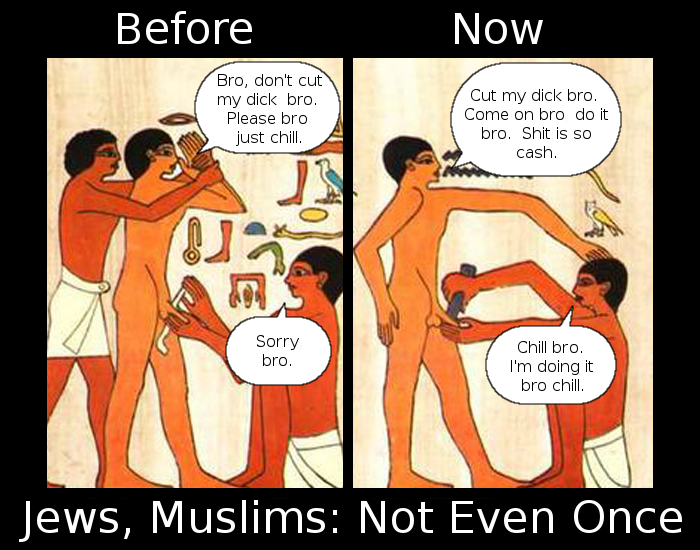Islam Versus Europe
November 12, 2013

Both originate with Semitic peoples in the Middle East.
Both eschew pork.
Both practise the genital mutilation of children.
Both developed a moral code based on an in-group/out-group concept, with members of the out-group being portrayed as impure.
Both have strong cultural sanctions against marriage to members of the out-group.
Both see contemporary and historical events through the prism of a victimhood narrative, in which each is the victim of other people’s wrong-doing.
Both display an astonishingly strong sense of empathy with other members of their in-group living elsewhere in the world, coupled with an equally astonishing disregard for members of their out-group, even people they have grown up with or interact with in daily life.
Both falsify history to claim that European civilisation’s ascent to global dominance would have been impossible without them. Generally, this takes the form of laying claim to inventions that are alleged to have played a key role in this ascent.
Both claim that anyone who criticises their conduct must be motivated by irrational, pathological hatreds: Islamophobia and anti-semitism. Curiously, there are no other examples of such alleged motiveless hatreds of any other people or religion found elsewhere within the historical record.
Both are incapable of admitting historical wrong-doing because this would conflict with their divinely-mandated self-image as faultless: Muslims “The Perfect Nation”, Jews “The Chosen People”.
Both developed moral codes that permit the use of deception against members of their out-group.
Both have developed cultures and ideologies that are, in effect, forms of borderless nationalism. As such, they act in opposition to nationalism of the more traditional type, that is the attachment of peoples to their historical homelands.
Both demand that governments use their power to criminalise and otherwise repress free expression.
Both cultures have been characterised by very high levels of consanguineous marriage and the genetic abnormalities that follow from this.
Both share a long historical experience of living as minorities in other people’s countries.
Both obsess about defensive reactions to their past aggression against others, excluding from their standard narrative the initial action that provoked the defensive reaction from the out-group. Muslims obsess about the Crusades, omitting to mention the fact that the Crusades were a reaction to centuries of Muslim invasion, conquest, murder and enslavement of indigenous Christians. Jews obsess about fascism, omitting to mention the fact the fascism was a reaction to the Jewish-dominated Bolshevist movements that victimised millions of indigenous Christians.
Both are strong advocates of diversity, multiculturalism and immigration within European societies but show no interest in such policies within their own homelands.
Both have developed cultures of rule-following with elaborate systems of rules governing the minutiae of daily life, derived from revered written texts and time-honoured commentaries upon them. In the tension between bureaucracy and democracy that characterises our own times, that is the practise of rule-following versus the use of independent judgement, this perhaps predisposes both sets of Oriental peoples to favour the former.
Both exhibit an overblown pride, amounting to a sense of supremacism, that sits curiously at odds with the historical failure of their own societies.
For both, the obligation to emigrate forms part of religious tradition. Jews believe their god told Abraham to emigrate to Canaan to found a religiously pure community. Muslims believe their god told Muhammad to emigrate to Medina to found a religiously pure community.
When resident in countries not their own, both tend to construct parallel societies within the greater society, featuring separate schools and legal systems.
Both view themselves collectively, developing institutions intended to represent their collective interests to the outside world.
Both eschew fact-based discussion, tending to express disagreement by launching moral accusations and invoking emotionally-charged symbols and associations rather than engaging in rational, evidence-based discourse.
